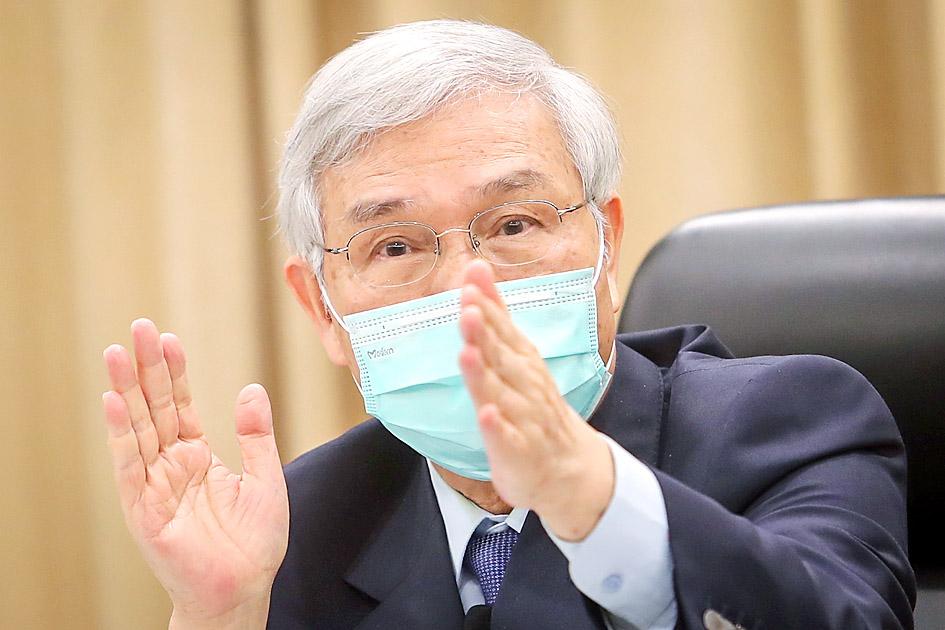The central bank yesterday kept its policy rates in place, while raising its forecast for GDP growth this year from 4.53 percent to 5.08 percent, saying that this month’s COVID-19 outbreak has had little negative effect on exports and private investment, although uncertainty lingers.
Despite a vibrant economy, the central bank said it was not worried about inflation, nor was it inclined to further tighten credit, as the level-3 COVID-19 alert and coming property tax hikes have already helped cool the real-estate market.
Central bank Governor Yang Chin-long (楊金龍) said he agreed with the US Federal Reserve that current inflationary pressures are temporary and would start to subdue next quarter when the low base effect tapers off.

Photo: CNA
Excluding spikes in oil prices and airfares, consumer prices remain stable, giving the central bank room to hold policy rates unchanged, Yang told an online news conference.
It is the first time that the central bank has moved the quarterly media briefing online after its board members met in three separate rooms to avoid infection risks.
The central bank is looking at an annual increase of 1.58 percent in consumer prices this year with the core consumer price index, a more reliable long-term price tracker because it expels volatile items, clocking a 1.1 percent gain.
Although consumer activity has come to an abrupt halt, exports and private investment continue to pick up as the US and Europe reopen their economies, favorable for global trade, Yang said.
Exports this quarter are likely to rise by more than 30 percent from a year earlier, riding on strong inventory demand worldwide for tech and non-tech products, Ministry of Finance data showed.
The governor reiterated that he was uncomfortable about increasing interest rates soon, as even talking about it could attract hot money, while peers around the world maintain quantitative easing to support their economies.
The New Taiwan dollar has climbed to a near three-decade high against the US dollar this year on the back of robust exports and relatively generous dividend payouts by local listed firms, Yang said.
Yang said he understood that tight movement restrictions were responsible for sluggish property transactions, and the market could regain traction once the level 3 alert is lifted.
“The central bank will keep a close watch, and take quick action to rein in property price hikes whenever necessary,” he said, as the effect of selective credit controls is not yet evident.
However, the governor said he has been pleased with ultra-low instances of bad loans linked to mortgage and construction financing.

SECURITY: As China is ‘reshaping’ Hong Kong’s population, Taiwan must raise the eligibility threshold for applications from Hong Kongers, Chiu Chui-cheng said When Hong Kong and Macau citizens apply for residency in Taiwan, it would be under a new category that includes a “national security observation period,” Mainland Affairs Council (MAC) Minister Chiu Chui-cheng (邱垂正) said yesterday. President William Lai (賴清德) on March 13 announced 17 strategies to counter China’s aggression toward Taiwan, including incorporating national security considerations into the review process for residency applications from Hong Kong and Macau citizens. The situation in Hong Kong is constantly changing, Chiu said to media yesterday on the sidelines of the Taipei Technology Run hosted by the Taipei Neihu Technology Park Development Association. With

CARROT AND STICK: While unrelenting in its military threats, China attracted nearly 40,000 Taiwanese to over 400 business events last year Nearly 40,000 Taiwanese last year joined industry events in China, such as conferences and trade fairs, supported by the Chinese government, a study showed yesterday, as Beijing ramps up a charm offensive toward Taipei alongside military pressure. China has long taken a carrot-and-stick approach to Taiwan, threatening it with the prospect of military action while reaching out to those it believes are amenable to Beijing’s point of view. Taiwanese security officials are wary of what they see as Beijing’s influence campaigns to sway public opinion after Taipei and Beijing gradually resumed travel links halted by the COVID-19 pandemic, but the scale of

A US Marine Corps regiment equipped with Naval Strike Missiles (NSM) is set to participate in the upcoming Balikatan 25 exercise in the Luzon Strait, marking the system’s first-ever deployment in the Philippines. US and Philippine officials have separately confirmed that the Navy Marine Expeditionary Ship Interdiction System (NMESIS) — the mobile launch platform for the Naval Strike Missile — would take part in the joint exercise. The missiles are being deployed to “a strategic first island chain chokepoint” in the waters between Taiwan proper and the Philippines, US-based Naval News reported. “The Luzon Strait and Bashi Channel represent a critical access

Pope Francis is be laid to rest on Saturday after lying in state for three days in St Peter’s Basilica, where the faithful are expected to flock to pay their respects to history’s first Latin American pontiff. The cardinals met yesterday in the Vatican’s synod hall to chart the next steps before a conclave begins to choose Francis’ successor, as condolences poured in from around the world. According to current norms, the conclave must begin between May 5 and 10. The cardinals set the funeral for Saturday at 10am in St Peter’s Square, to be celebrated by the dean of the College